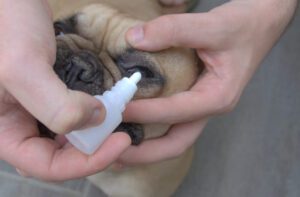Dog Eye Allergies: Causes, Symptoms, and Remedies

Table of Contents
What are Dog Eye Allergies?

Dog eye allergies are allergies that affect a dog’s eyes. The medical term for dog eye allergies is allergic conjunctivitis. In other terms, allergic conjunctivitis is inflammation and irritation of the eyes caused by environmental allergens.
Allergic conjunctivitis, which involves redness, irritation, and discharge of the eyes, can flare up during different seasons, or it can be present year-round.
While allergies in dogs commonly affect the gastrointestinal tract and skin, eye problems are possible. In fact, dogs with allergic dermatitis, or inflammation of the skin from allergies, often suffer from allergic conjunctivitis.
Allergies that affect the skin and eyes are caused by a hypersensitivity to environmental substances, and this is often referred to as atopic dermatitis. While any breed or mixed breed can develop atopic dermatitis and subsequent allergic conjunctivitis, certain dog breeds more commonly have this condition.
These breeds are Golden Retrievers, Labrador Retrievers, German Shepherds, Bulldogs, Boxers, Cocker Spaniels, Doodle-type breeds, and Westies.
What Do Dog Eye Allergies Look Like?
A dog with allergic conjunctivitis may have eyes that appear very red, swollen, and watery. The watery appearance is caused by excessive tear production and can give the eyes a glassy appearance.
In more chronic situations, watery tears can progress to a thicker eye discharge which may be lighter in color.
The overall inflammation from dog eye allergies often triggers itchiness, and the dog may rub their eyes with their paws or along surfaces such as furniture.
What Causes Dog Eye Allergies?
Dog eye allergies occur as a result of allergic reactions on the surface of the eyes. Some of the most common environmental factors causing eye allergies in dogs include:
- Tree and Grass Pollen: Eye allergy symptoms in dogs are often caused by pollen. Pollen can stimulate the immune system and trigger allergic reactions.
- Mold and Mildew: These can not only lead to an allergic reaction and eye problems but also cause breathing difficulty in some cases.
- Dust and Dust Mites: Dust and dust mites can cause sneezing and eye discharge. They can also trigger breathing difficulties.
- Fleas: Fleas cause allergies which can lead to eye problems. Dogs suffer from a specific type of flea allergy dermatitis (FAD) – a sensitivity to flea saliva.
- Dander, Hair, and Feathers: Pet and human dander and hair, as well as feathers, are potential allergens for dogs.
- Cigarette Smoke: If dog owners smoke, it can lead to itchy eyes for your dog. That can then become an allergic reaction as it causes irritation to your dog’s cornea.
- Colognes and Perfumes: Intensely scented chemicals, such as colognes, perfumes, and some household cleaners, are among the most common causes of allergic reactions.
What Are the Signs & Symptoms of Dog Eye Allergies?

Eye redness, discharge, and itchiness are the most common symptoms of dog eye allergies. Here is a more detailed overview of the signs and symptoms of allergic conjunctivitis.
- Eye Irritation: Red eyes are the first sign of eye allergies. Over time, the dog’s eyes appear swollen and sore.
- Excessive Tearing: Excessive watery or mucousy eye discharge.
- Squinting: If your dog has an eye allergy, you might notice them squinting.
- Pawing: A dog with eye allergies will paw at its eyes or rub them along surfaces. This is the dog’s attempt to get rid of the allergen and relieve the itch.
How are Dog Eye Allergies Diagnosed?
To diagnose dog eye allergies, a veterinarian will perform a full physical examination, including the eyes. The veterinarian will rule out other causes of eye irritation, such as dry eye (known as KCS), corneal ulcers, eyelid growths, and infections, before diagnosing allergic conjunctivitis. Dog eye allergies are often diagnosed by ruling out other eye problems.
Vets may perform a test called “conjunctival cytology“ – the veterinarian will swab the eye and analyze the sample under a microscope. The presence of inflammatory cells helps to confirm the allergy diagnosis in some cases, but this test may not be conclusive.
If your dog is not responding to your regular veterinarian’s treatment, they may refer you to a board-certified veterinary ophthalmologist or dermatologist for further evaluation. A veterinary dermatologist may recommend allergy testing to determine the exact allergen or allergens.
Does My Dog Have Allergies or an Eye Infection?
Dog eye allergies manifest with red and watery eyes, while eye infections result in more intense signs and symptoms, including light sensitivity and yellow or green purulent dog eye discharge, which may affect one or both eyes.
Untreated allergic conjunctivitis can evolve into eye infection, especially if the constant rubbing of the eyes results in bacterial contamination.
It is important to have your veterinarian examine your dog to differentiate the diagnosis of allergic conjunctivitis. Dr. Lisa Steinberg says, “When your dog’s eyes look red or irritated, your veterinarian may diagnose conjunctivitis from allergies after ruling out an infection, eyelid growths, dry eye, ulcers, glaucoma, and some autoimmune conditions.
Conjunctivitis from allergies, also known as dog eye allergies, is a condition I see almost every day in practice, and it tends to be more common during different seasons of the year. Once dog eye allergies are diagnosed, you can decrease your dog’s discomfort by keeping their eyes clean and rinsing them regularly as directed by your veterinarian.”
What Is the Treatment for Dog Eye Allergies?

From home remedies to over-the-counter products to prescription medication – there are several dog eye allergy treatment options. Here are some popular treatments:
- Saline Flushes: If your dog has a mild allergic reaction, you can simply flush the eyes with a gentle saline solution. This is not a cure, but it may help remove the allergen.
- Eye Washes: Instead of saline, pet owners can use eye wash for dogs. Some of these eye wash solutions may be medicated, and some may help to simply flush the allergens from the eyes.
- Eye Drops: Another treatment option are eye drops. Eye drops for dogs come with different active ingredients and often contain antibiotics and steroids or anti-inflammatories.
- Antihistamines: These medications block the effect of histamine (the culprit behind allergies). The most commonly used antihistamine is Diphenhydramine (Benadryl).
It is very important to consult with your vet before treating your dog with any over-the-counter remedies
What Can I do to Help My Dog with Eye Allergies?
There are many products, pet owners can use to help their dog’s eye allergies. Here is a closer look at some of the most popular products.
- Vets Preferred Eye Wash Drops for Infection & Tear Stain Remover: Foreign particles like pollen, dust, and dirt can lead to chronic irritation and infections. Pet owners can use the dog eye drops rinse to relieve allergy symptoms, rinse out dirt, and moisturize dry eyes. Use the tear stain remover for dogs regularly to relieve tear stains, as well as to break and dissolve crust and discharge. This dog eye wash is produced in a GMP-certified facility in the USA under strict supervision, to ensure optimum quality and safety. Pet owners give this product 4.4 out of 5 stars.
- Terramycin Antibiotic Ointment for Eye Infection Treatment in Dogs: This product treats some bacterial infections involved with conjunctivitis, keratitis, pink eye, corneal ulcer, blepharitis, and other infectious diseases. This is an antibiotic ointment for eye infections in dogs, cats, cattle, horses, and sheep and is loaded with active ingredients like oxytetracycline hydrochloride and Polymyxin B Sulfate. Terramycin is a broad-spectrum antibiotic treatment for eye infections specified on product labeling. Easy to administer with no need for separate applicators or accessories. Apply topically to the eye as directed by your veterinarian. Pet owners give this product 4.7 out of 5 stars.
- Nutri-Vet Eye Rinse for Dogs: Nutri-Vet Eye Rinse for dogs is a non-irritating ophthalmic solution that gently cleanses the eyes and surrounding tissues to help relieve discomfort and control irritation from dried mucous, foreign material, pollen, and other irritants. It also helps remove tear stains and slows down their formation. This product is specially formulated to create an inhospitable environment in the eyes for germs and bacteria. It cleanses and soothes even the most sensitive eyes. Nutri-Vet Eye Rinse for dogs is a safe and effective way to keep dogs’ eyes free of irritation and can help soothe the effects of seasonal allergies such as smog and pollen. Pet owners give this product 4.5 out of 5 stars.
- Can-C Dog Eye Drops with N-Acetylcarnosine: Can-C is the first and only patented NAC eye drop that uses the exact formula proven effective in both animal and human trials, offering a non-invasive alternative to cataract surgery. This product has been developed as cataract drops for dogs to normalize senile cataract impairment without the need for surgery. The drops lubricate the eye and cornea improving their overall health. Pet owners give this product 4.2 out of 5 stars.
- Finn Allergy & Itch Supplement for Dogs: This product has been formulated to support seasonal allergies and skin health while giving your best bud’s immune system a boost. It is also loaded with 300+ beneficial compounds. It contains antioxidants, including quercetin, zinc, and vitamin C. The product also has prebiotics, probiotics, colostrum, and bromelain for digestive health and enhanced immune response. Finn Allergy & Itch soft chews are formulated with a powerful blend of natural ingredients to support seasonal allergies, skin health, and immune defense. Pet owners give this product 4 out of 5 stars.



















